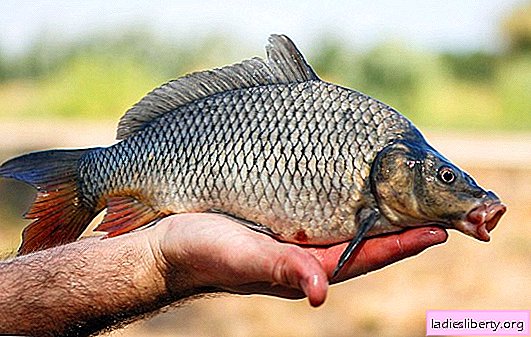
The benefits of carp, one of the first fish domesticated by humans, are comparable to the nutritional qualities of such more famous gifts of the aquatic world as trout and salmon.
The carp is also good because it is easy to cook it deliciously, and there is almost no possible harm from its appearance on the table.
How the composition and benefits of carp are interconnected, what it looks and tastes like
The origin of all types of carps can be traced back to the domesticated carp, which he, once upon a time in the wild, forced out due to unpretentiousness and fertility.
Separate varieties were bred purely with gastronomic interest - carp scaly, specular, bare. Others were created only decorative (like bright koi). The latter are quick-witted, they almost recognize the owners and are not strangers to affection (scratching the broad back), but, fortunately, these are just the decorative forms of the carp.
Carp is a freshwater inhabitant of rivers and lakes in Asia and Europe.
In appearance it resembles crucian carp, but the carp is larger - about 30–40 cm in length and 500–800 g of weight is reached by an average non-aging individual.
Large dark golden scales of carp adorn the massive, cylindrical body, the fish has a large mobile mouth and two pairs of functional whiskers.
Even 4,000 years ago and many centuries later, carp was highly valued on the festive and everyday table not only by ordinary people, but also to know in the lands from China to Rome.
Translated from Greek, the name of this fish can be interpreted as "harvest".
He, as already mentioned, is rapidly growing population, but also expressively valuable among the whole crop of freshwater fish in principle.
There are a lot of bones in the tender white meat of carp, but this flaw is more than covered by the excellent, slightly sweet taste. And to cook without loss of benefit this fish can be in any way. For example, it is often baked with vegetables and in sour cream sauce, fried, stewed, added to the ear, used for cooking aspic, cutlets.
The vitamin assortment is presented in the carp so well that they, along with red fish and sturgeon, are recommended to decorate the diet for the prevention and treatment of vitamin deficiency.
· Vitamin B12 is known as an antioxidant and promotes the synthesis of DNA and myelin, a substance indispensable for building neuron membranes. Also, the vitamin is useful in acute and chronic hypoxia, as it increases the consumption of oxygen by cells;
· Vitamin B9, not synthesized by the human body, is recommended to be obtained from plant foods for better digestibility, but it is not bad in the carp and is valuable for healthy appetite and production of serotonin, which is responsible for a positive psychological state;
· Vitamin K despite the fact that its deficiency in the body is a rare phenomenon, it cannot be underestimated - it is required by the kidneys, prevents inflammatory diseases characteristic of the elderly and is involved in the mutual metabolism of vitamin D and calcium.
Carp is a freshwater fish, but it contains a lot of iodine, a deficiency of which harms, first of all, the thyroid gland. It should be noted that it is involved in almost all processes with iodine. Increasing its content, carp is useful for carbohydrate metabolism, cholesterol breakdown and body growth in childhood and adolescence.
Manganese has a positive effect on liver health, is involved in enzymatic activity, lowers the body's response to allergens and is even important for the reproductive female system.
Phosphoric acid is necessary for the production of a number of enzymes, which in turn are responsible for the main metabolic processes of the body. Moreover, the lack of phosphate salts in the diet leads to a weakening of the skeletal system, tremors and cramps in the limbs, and physical exhaustion. The latter is especially dangerous for those who are forced to limit themselves for some reason in food.
This whole complex, as well as the presence of vitamins C, B1, B6 and A, as well as calcium, sodium, potassium, chlorine, cobalt and zinc, makes carp useful for the spinal cord and brain, not just for, say, strengthening memory, but principle for the full functioning of these vital parts of the human body.
Regarding the effect on blood, regular consumption of carp meat helps to regulate its density, sugar and iron content, as well as increase blood circulation in the internal organs and upper layers of the skin. The latter is of great importance for the extension of youth, even and beautiful face tone.
What are the benefits of carp in diet
The previously mentioned vitamin B12, among other things, is involved in lipid (fat) metabolism, so there is a benefit in the carp for dietary nutrition in order to reduce weight, although it is very caloric in itself.
100 g of boiled carp contains about 100 kcal, 100 g of fried carp - 200 kcal, the energy value of braised or baked fish is somewhere around 150 kcal.
Carp meat passes through the digestive system quite quickly, which is not surprising - one of its properties is the acceleration of its work. What for those wishing to lose weight is favorably complemented by the ability of carp to activate the removal of toxins and toxins.
What diseases and disorders are the benefits of carp?
Carp meat has a high protein content, the digestibility of which is comparable to chicken, so carp can also be recommended for nutrition during recovery from illness and the healing of fractures and wounds.
For heart health, carp is useful in that it reduces myocardial excitability and strengthens the heart muscle.
If we talk about the heart in a more figurative sense, then it is useful in that it heals the central nervous system and reduces the excitability of stress origin, there is even evidence that carp is useful for failures in love - its meat regulates the release of harmful, provoking the development of depression, hormones.
Carp is a fish, and like any fish it is useful for immunity, but it also has an anti-inflammatory property.
With its use, damaged mucous membranes heal faster and better.
The use of carp can also be recommended for a number of specific diseases:
· Hypertension and hypotension - normalizes blood pressure;
Osteoporosis - strengthens bone tissue;
Arthritis - rejuvenates the joints;
· Pancreatitis - low-fat fish species do not burden the pancreas, but supply irreplaceable substances to it.
Fish on the menu is required for diseases of the kidneys and spleen, cooked naturally in a non-greasy and non-fried way.
Why can there be harm from carp
Feeding mainly in the near-bottom area, where mollusks and worms live in silt, the omnivorous carp accumulates harmful substances in its body. Moreover, untouched by man, not polluted water bodies today are a rarity.
The fact that carp is bred in artificial conditions has both its pros and cons.
The main disadvantage is that fish feed is often enriched with preparations that are beneficial for the manufacturer, for example, growth accelerators and antibiotics.
So the habitat to eat carp without harm is of great importance for fans of clean and healthy food.
It is strongly not recommended to eat carp meat in the form of sushi or to experiment with pickling it - there can be great and long-term harm from carp, since there is a high risk of infection with parasites, which are typically found in freshwater fish.
The harm from carp is great (and therefore it is contraindicated) with bronchial asthma (is the so-called non-specific irritant) and with atherosclerosis (the meat of this fish is high in cholesterol).











